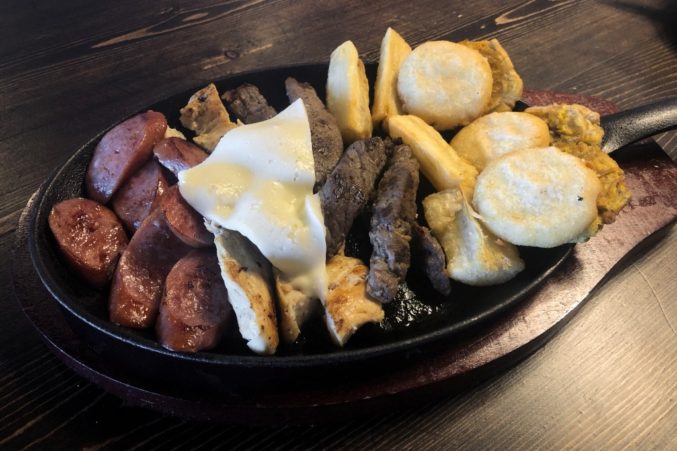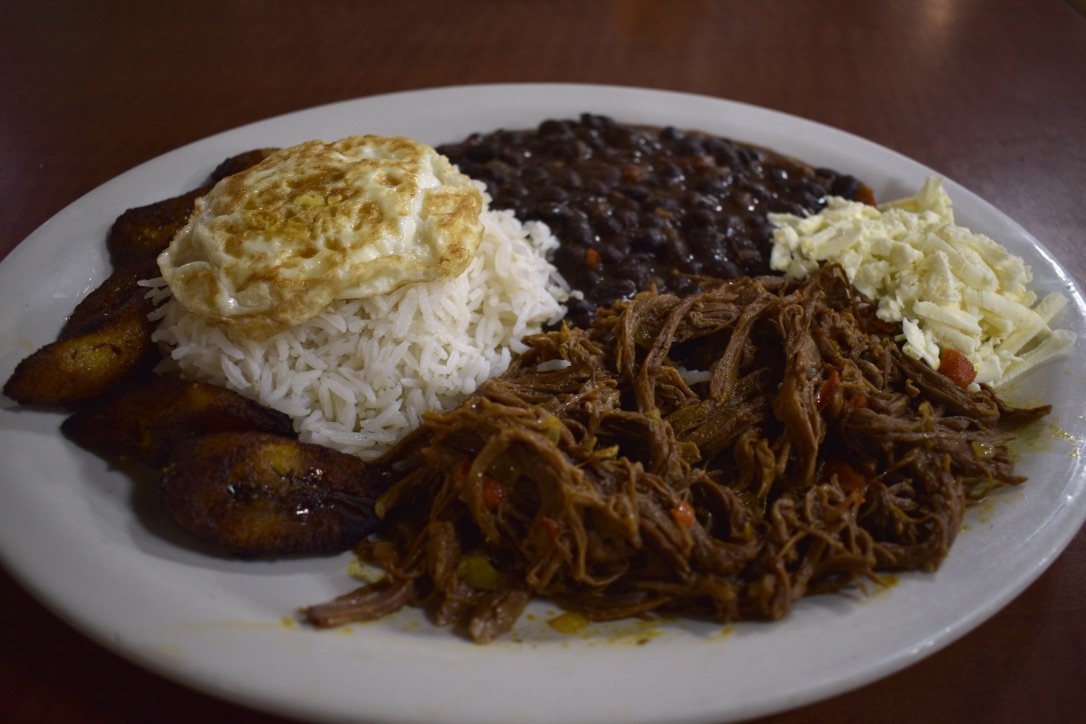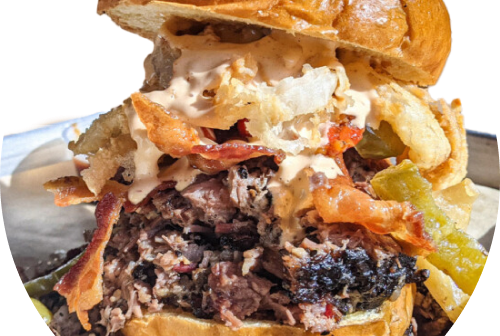Inside Hola Café in Carrollton, Marc Anthony’s salsa thrums overhead and Venezuelan flags hang proudly on the walls. Manuel and Euclides Romero, the father-and-son owners of Hola Café, say things have been busy since their Venezuelan restaurant opened in June. “We’ve managed to show off our culture…our food with authentic Venezuelan flavor,” says Euclides. Like the pabellón, Venezuela’s national dish of juicy carne desmechada (shredded meat) braised with onions, green peppers, and tomatoes, next to creamy black beans, white rice, fried sweet plantains, fresh cheese and a fried egg. Best washed down, by the way, with a glass of papelón: fresh-squeezed lemonade sweetened with organic cane sugar.
When Hola Café (226 North Josey Lane) debuted last year, it was one of the first among a few recent Venezuelan restaurant openings. El Arepazo VZLA, in Carrollton at 2661 Midway Road, followed in November. Mango’s Grill in Fort Worth arrived just one month after that. As many Venezuelans flee Nicolas Maduro’s regime, they’ve settled in Dallas to start new lives. In some cases, they’ve opened restaurants here.
“We left behind family, businesses…businesses that were prosperous: a mini market, a pizzeria, a travel agency, a car rental,” Manuel says. “All of that is over.”
But opening a Venezuelan restaurant, albeit complicated, forges a fresh direction in a new country. It also helps create connection among the Venezuelan diaspora. Hola Café hosts Venezuelans’ startup events and donation drives for people still in Venezuela. On Friday and Saturday nights you’ll even find live music. “Hola Café is a meeting point for the Venezuelan community. It’s a reference point for the culture, the food, the music, for that which is Venezuelan—the Venezuelan idiosyncrasy,” says Euclides.

So, as they build kith and kin in the Dallas area, these restaurateurs do so with the same tools as the immigrant communities did before them: food and soul and flavor.
At El Arepazo, that comes in the form of a cultural sampler platter, if you will, a spread of mini empanadas, tequeños, a beef- or pork-filled arepa, plus pork, beef, and cheese cachapas, which are sweet corn crepes—smoky and lightly charred by the grill. The tequeños come with a creamy avocado salsa called guasacaca. Most everything is prepared in house. After opening El Arepazo with her husband Ali Cadena (a Dallas resident of 24 years), Sinia González even taught herself to bake tres leches from scratch and brew chicha, a subtly sweet Venezuelan rice drink with notes of cinnamon. While the dishes themselves may vary from restaurant to restaurant, the owners of all three Venezuelan spots share a core ingredient: perseverance. They had dreams. They realized them.
In 1999, Karina Castellano—Mango’s Grill co-owner—came to Fort Worth with “a suitcase full of dreams, and my husband and two kids.” While she cleaned houses, her husband started a remodeling company. Castellano put it this way: “You have to work for those dreams. Those are not going to come by themselves, you have to go for it.” The Castellanos hail from Maracaibo and the food at Mango’s Grill is inspired by, but not limited to, that city’s cuisine. They serve parrillada, a salver of savory grilled chicken, beef, and sausage accompanied by mini fried corncakes called arepitas fritas, tostones, and fried yucca, ideal for dipping in the homemade salsa rosada. There are also empanadas filled with cheese, chicken, or beef—a fried, lightly sweet corn pastry filled with tender carne desmechada. Castellano’s pride and joy, however, are her cachapas filled with soft queso de mano (akin to a Venezuelan-style mozzarella) and slathered with crema de leche and grated queso duro.
But Mango’s Grill is much more than food, it’s a testament. “I had to survive,” Catellano says. “I had to provide to my kids a better life.” And Castellano wants to encourage Venezuelan immigrants. She sees herself and her restaurant as inspiration: “When they come, they say, ‘So, is this possible?’ And I say, ‘Yeah!’”
Meanwhile at El Arepazo, González aims “to reach all those who are not Venezuelan, so that they know our food.” Back at Hola Café, the Romeros likewise share their story through Venezuelan cuisine. “It’s a spiritual experience, to come to Hola Café because we don’t only feed the body, but also the soul,” says Euclides. “And you laugh, you remember what it is to live. Therefore, the people love it, and they come.”
Even if it’s a humble plate of arepitas fritas dipped in cream and grated queso blanco, “it fills the soul.”






